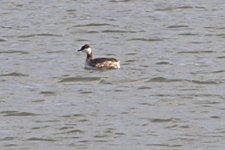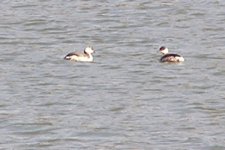Tring to figure out what kind of duck this is. It was at Ross Lake in Ross county Ohio today. There seemed to be a pair of them hanging together. I also seen 10 Ring-necked ducks a couple of Malards and lots of Canada Geese. When I first seen this pair I thought it was a pair of Loons as there have been reports of a pair of Loons in the area. I know the photo isn't very good but hope it can be ID'ed from it.
Thanks
Rod Raisanen
Thanks
Rod Raisanen






